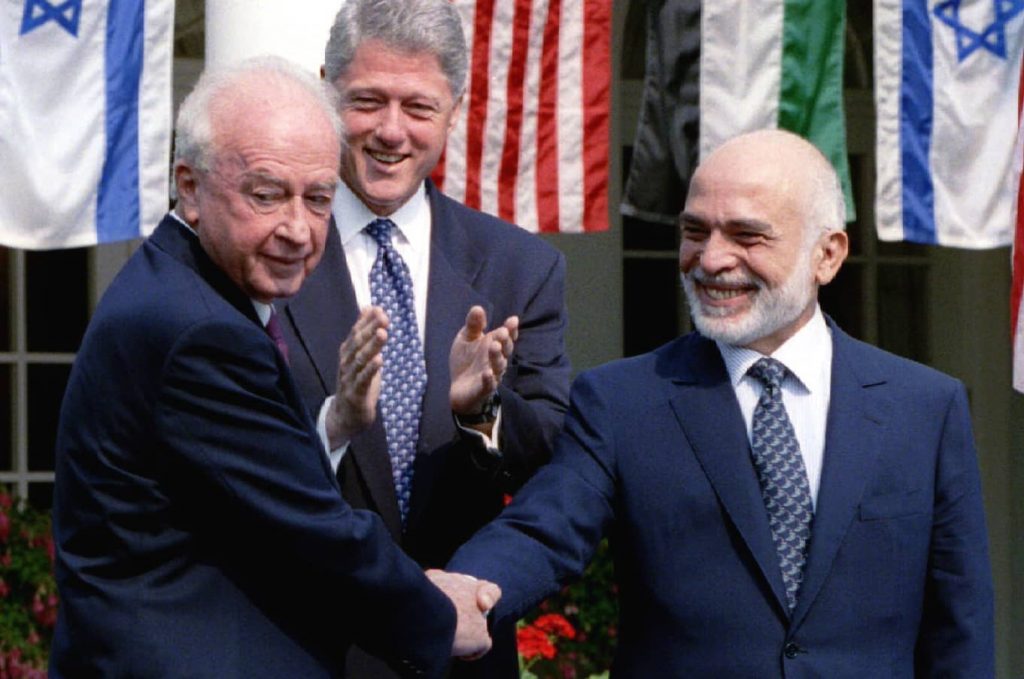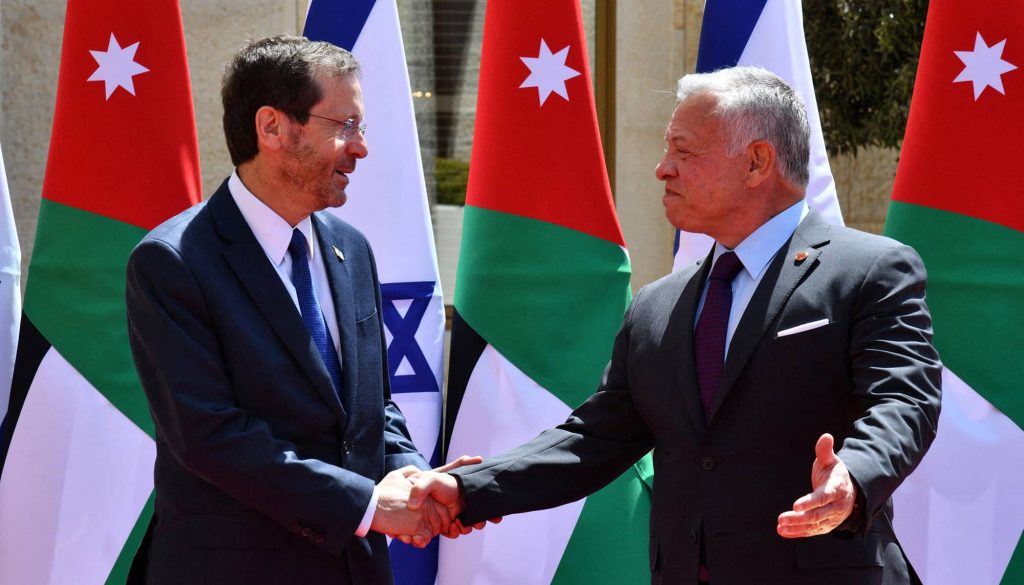My relationship with Jordan began even before the peace treaty was signed. It started in Washington DC where I was posted in the late 1980s as the spokesperson of the Israeli Embassy. This was shortly before the Iraqi invasion of Kuwait in 1990, and shortly after King Hussein of Jordan had decided to disengage from the West Bank and separate the future of Jordan from the Palestinian issue.
I used to attend briefings at the State Department for foreign embassy personnel and would meet other young Middle Eastern diplomats there, some from countries with which Israel didn’t have diplomatic relations. The Washington atmosphere made it easier to initiate small talk which sometimes slowly turned into professional dialogue.
One of those young diplomats was Marwan Muasher who was also the spokesperson of his embassy, the Embassy of Jordan. He literally worked up the street from me, since both embassies were located on International Drive in Washington. We often shared the same cab back to the office. As we began talking, we found more and more in common as young Middle Eastern diplomats serving their countries in the most important political capital of the world. Our professional dialogue and later friendship continued throughout the peace negotiations which took place in Washington, culminating in the signing ceremony in the Arava valley on the Jordan-Israel border in October 1994.
After Marwan and I left Washington and returned home, we later found ourselves working together again. He became Jordan’s first ambassador to Israel and I was appointed as the first director of the Jordanian Desk in the Ministry of Foreign Affairs. Our joint mission was to implement the provisions of the Israel-Jordan Peace Treaty. Marwan kept rising in government service and eventually became Foreign Minister and Deputy Prime Minister. I transferred from the foreign ministry to the military, becoming the IDF spokesperson, which carried with it the rank of brigadier general.
When we met at that peace ceremony in the Arava Valley in 1994, we were both very optimistic; we thought that the hopes and dreams of a flourishing Israel-Jordan strategic partnership would indeed come true.
Current Status of the Bilateral Relationship
Almost 30 years later there is, alas, a souring sense of bitterness and disappointment. The great potential strategic relationship has been realized only in small part. Beyond some (significant) economic aspects, little was left of the great potential except for some intelligence cooperation, which anyway pre-existed the peace treaty.
Public sentiment in Jordan toward Israel remains generally hostile, but a few salient incidents have also fed the fundamental mistrust between leaders. These include the attempted Mossad killing of senior Hamas official Khaled Meshaal on Jordanian soil in 1997, and twenty years later, the tragic incident in which an Israeli embassy security guard shot to death a Jordanian civilian (and was welcomed by Prime MInister Netanyahu upon his return to Israel.)
King Abdullah did little to improve relations when in 2018 he declined to renew the lease of two border zones in the Arava Valley, the Tzofar and Naharaim enclaves, for farming use by Israelis, after the 25-year lease provision in the 1994 peace treaty expired.
On the economic side, tensions include Jordan’s periodic raising of critical needs such as water supply, and the collapse of the ambitious plans for a “Red-Dead” project that would have carried Red Sea waters to the Dead Sea (which is drying out) to produce hydro-energy. The benefits Jordan drew from the Qualifying Industrial Zones – which allowed Jordan to export goods from zones in Jordan duty-free to the US, if they had a certain percentage of Israeli inputs – were replaced by direct access to the American market when a US-Jordan free trade agreement was signed in 2001.
All this undermined the good will needed for the pursuit of a strategic partnership. But the most critical element of today’s mistrust was the Israeli government policy – as the Jordaninans see it – of nullifying the “two-state” paradigm as a possible solution to the Palestinian problem. This has always been the prime cause of Jordan’s ongoing strategic anxiety and was reflected in Jordan’s decision not to attend the ministerial-level Negev Forum in March 2022 with Israel’s Abraham Accords partners, Egypt and the US.
In general, there are four main issues in the Israel-Jordan relationship.

The Palestinian issue
The future of the Palestinians is certainly one of the most contentious issues for the Hashemite royal house. It is an internal issue, with Palestinians composing the great majority of the citizenry of Jordan, with direct bearing on the national identity of the state and potentially threatening to the Hashemite’s survival.
The two-state paradigm as a possible solution to the Palestinian issue, with security and demilitarization arrangements which take into account the needs of Jordan and Israel, used to be seen as a reassuring answer to the Jordanians’ concerns. The existence of an independent Palestinian entity, with elements of sovereignty, even if reduced, could provide an answer to Palestinian national aspirations, and would thus reassure the broad Palestinian population in Jordan, who may no longer see themselves as disgruntled refugees. Meanwhile, some form of Israeli, joint, or international presence in the Jordan Valley would serve as a political, demographic and physical buffer between the Hashemite Kingdom and an independent Palestinian entity.
Prime Minister Netanyahu’s ongoing policy, for over a decade, to set aside the “two states solution” paradigm has fed Jordanian suspicions. If Palestinian national aspirations are to be totally disregarded, Jordan’s internal security and order are likely to be threatened – particularly when some Israelis revive the “Jordan is Palestine” paradigm.
Moreover, with respect to the Abraham Accords, Jordanians have been watching anxiously as Netanyahu appears to them to have leaped directly to the Gulf, “skipping” over the Palestinian issue and seeking a regional order of functional economic peace. This only adds to the growing Jordanian strategic anxiety.
The Jordanian response to the recent American-sponsored notion of a transport corridor linking India to the Mediterranean seems to be more positive though, again, without details it is hard for anyone to have a concrete response.
Jerusalem
The second critical issue has to do with the Jordanian role in Jerusalem. The peace treaty formally anchored Jordan’s special interest in the HMuslim holy sites in Jerusalem and enshrined ashemite authority over the Waqf [Islamic foundation] on the Haram al-Sharif/Temple Mount. This point is particularly important for Jordan – a strategic foothold giving Jordan a say in any future agreements regarding Jerusalem.
It was the Haram al-Sharif that witnessed the assassination of King Abdullah I in 1951, by a Palestinian, on the steps of Al Aqsa Mosque. at the end of his historic visit and amidst his secret talks with the Israeli leadership. This trauma is deeply etched in the national and personal memory of the royal house. For the late King Hussein, who was the young grandson who accompanied King Abdullah and witnessed his assassination, this was a formative experience which never left him throughout his life. There is no doubt that this is also the case for the great-grandson, the current King Abdullah II.
Following the Abraham Accords, the Jordanian feared that Israel would “trade” Jordan’s special status on the Haram al-Sharif/Temple Mount and potentially give it to Saudi Arabia, in exchange for an Israeli-Saudi rapprochement, with all that this would imply for Jordan’s standing. Adding to these concerns was an incident which led to the cancellation of the visit of King Abdullah’s son, Prince Hussein, to Haram al-Sharif in March 2021). The Jordanians did not accept the explanation that disagreements on security measures caused a delay, and saw this as confirmation of darker intentions (although some reassurances have been given since).
Economics and Demographics
The third challenge to Israel-Jordan relations concernds Jordan’s severe economic, demographic and infrastructure situation. Jordan has absorbed about one and a half million refugees from Syria and Iraq, a heavy burden both on the economy and a potential threat to internal security. With an already large population of Palestinian refugees, Jordan must cope with water and energy shortages, poor infrastructure and a faltering economy.
COVID exacerbated this situation. The damage to tourism, one of Jordan’s main economic revenues, compounded the Kingdom’s economic problems. Thus, the decision made at the Prime Minister Bennett-King Abdullah meeting of July 2021 to allow a significant increase in Jordanian exports to the Palestinian Authority was of great significance.
Meanwhile, the chronic lack of water in Jordan is still an acute and strategic crisis. A key clause in the Israeli-Jordanian peace agreement stipulated the distribution of Yarmouk River’s water between the two countries and established a mechanism for permanent annual water supply to Jordan from Israel.
In April 2021, during a drought in Jordan exacerbated by the COVID crisis, the Jordanians requested a special addition to the annual water supply from Israel. Initially, Prime Minister Netanyahu refused the Jordanian request, but later – after facing criticism, including from the US – he retracted and agreed to comply. Needless to say, this deepened and worsened the distrust which already existed between the two leaders.
Desalination is the right direction for the future, though it requires intensive electricity. Project “Blue and Green Prosperity,” offering Emirati funding for the infrastructure that would enable a trade-off – Israeli desalinated water for Jordanian solar energy – is such a strategic answer: it was initiated under the previous Israeli government, but endorsed and signed by all three sides under the present one, in August 2023.

Regional Security Threats
A fourth and final challenge is the problem of security threats that both Jordan and Israel face from Iran and its regional ambitions and from radical Islamist elements.
On Iran, Jordan obviously cannot act independently, but it is an important part of the coalition of Sunni countries in the Middle East. Jordan in particular seeks to coordinate both with Jerusalem and Washington. Importantly, Jordan actively resists Iranian efforts to establish a presence on its soil as an extension of the Iranian presence in Syria.
Regarding the threat of ISIS and other radical elements, Jordan is particularly vulnerable, given its borders with Iraq and Syria and the large number of refugees who fled from these areas. Jordan’s security forces are heavily burdened, and in this respect – as the King has admitted at times – it was reassuring to know that Israel “has Jordan’s back.”
This sense of solidarity originating in common threat perceptions, however, is eroding amidst fears of Palestinian unrest in the Kingdom. Israel’s policy towards Gaza – a mix, troubling to the Jordananians, of deterrence and the introduction of suitcases of Qatari money – appears to the Jordanians to strengthen Hamas and weaken the Palestinian Authority. Palestinian Islamic Jihad operations out of Gaza, backed by Iran, worries the Hashemite Kingdom about the prospect of a spillover of the violence and a radicalization from within. The present conduct of the Netanyahu Government to undermine the”Two States”paradigm – adds to the Jordanians’ alarm.
In conclusion, Israel must tend to its relations with Jordan. Without belittling the importance of our Abraham Accord partners, such as the Gulf countries, it is Israel’s duty to take care, first and foremost, of our nearest neighbors and peace partners. Every Israeli government should nurture the strategic triangle of relations among Israel, Jordan and Egypt. This requires much closer attention to the needs of Israel’s immediate neighbors, and avoiding provocative acts and pronouncements which may destabilize them. That is the essence of strategic partnership.



